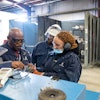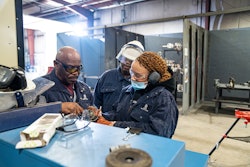Universities and colleges must fundamentally rethink how they prepare students for an AI-driven economy, as traditional four-year degrees alone may no longer provide the skills workers need, experts said at a recent Brookings Institution forum.
 Andrew Ng
Andrew Ng
"The number of software engineers, the number of AI developers is far smaller than the number of people that we hope will be able to do the work to build custom AI systems," Ng said, suggesting universities need to expand beyond conventional computer science curricula.
Ng highlighted online education platforms and "nanodegrees" — short, focused programs teaching specific skills like programming languages — as increasingly valuable alternatives or supplements to bachelor's degrees. These targeted credentials allow workers to gain relevant capabilities without the time and expense of full degree programs.
The discussion comes as employers increasingly drop bachelor's degree requirements for job postings, a trend panelists said reflects both labor shortages and growing recognition that specific skills matter more than credentials.
"There's definitely a trend when we see job ads where the share of jobs that require a BA is declining," said Dr. Gad Levanon, chief economist at Burning Glass Institute. "Some of it is because there is indeed a trend of employers trying to target not just BAs but also other people."
David Estrada, chief legal and policy officer at autonomous vehicle company Nuro, said his company relies heavily on workers with foreign visas because U.S. universities aren't producing enough graduates with needed technical skills.
"Currently, it's about 30 percent of our workforce working on these programs to power our vehicles who rely on worker visas from other countries," Estrada said. "Our country, the United States, is not producing enough skilled labor in this field and we need to address that."
Estrada called for greater emphasis on STEM education starting in K-12, noting that students in China and India often receive stronger preparation for technical careers than American students.
Nuro has partnered with De Anza Community College in California to create a specialized fleet technician program, allowing students to gain skills needed to work on autonomous vehicles through targeted coursework rather than a four-year degree.
Dr. Morgan Frank, an assistant professor at the University of Pittsburgh, emphasized that higher education institutions lack good data on which skills they're actually teaching and how those skills translate to career outcomes.
"We have really excellent cross-sectional data on the economy but not so much insight into workforce development, and in particular into how college education prepares you for different career trajectories," Frank said.
Frank pointed to emerging datasets tracking university syllabi and learning objectives across institutions as promising tools for understanding what students learn and whether it matches labor market needs.
The panelists agreed that successful preparation for AI-related careers requires bundling multiple skills together, not just teaching isolated technical capabilities. A computer programmer needs mathematical knowledge and collaborative abilities alongside coding skills, they noted.
"High-skilled worker" defined simply as anyone with a bachelor's degree misses important variations in what students study and what capabilities they develop, Frank said.
Several audience questions focused on how liberal arts colleges and universities can better prepare students for changing workplace demands.
Levanon added that beyond technical skills, employers increasingly value data literacy across all business functions — from marketing to human resources — and resilience to adapt to changing conditions.
"In a lot of business-related jobs, there is a huge increase in the amount of data," Levanon said. "There is a need for people in those departments to know how to use it, to ask the right questions and know how to answer them."
The discussion highlighted tensions around higher education's role as workforce demands shift rapidly. Ng noted that while education has strong long-term returns, economic pressures often lead to underinvestment.
"One of the inefficiencies that I think is quite tragic for education is that it has some short-term ROI," Ng said, explaining that quality training pays off within six months but delivers profound benefits over many years.
Ng emphasized that society faces a choice about whether to limit AI expertise to elite tech companies or democratize access through better tools and broader education — a decision with major implications for economic equity.
"If almost everyone in society is literate, we can read and write, we can build a much richer society," Ng said. "If Claude can use code written by a large tech company, why do you need to build custom AI for yourself? But the problem with this is this is not going to solve the huge number of applications in that long tail."
The Brookings Center on Regulation and Markets hosted the event. Loni Mahanta, nonresident fellow at Brookings, and Dr. Alberto Rossi, professor at Georgetown University, moderated the discussions.
You can watch the discussion here.
















